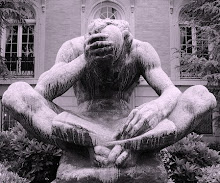Alex Castellanos, a Republican strategist who's on CNN's political talking heads team, came up with what I think will be an enduring metaphor for the Obama administration. He came out of nowhere with the idea--from Linux folks no less--of the "cathedral" and the "bazaar." They're great metaphors for top-down and bottom-up forms of software creation, governance, and even literary knowledge creation.
Really.
Much of what has been happening in literary studies is the cathedral approach. The theory is imported--perhaps from linguistics, psychology, or philosophy--and applied to different texts. Often, texts are forced into the forms dictated by these theories, and the parts that don't fit are lopped off and ignored (some texts, like Beowulf and Heart of Darkness, can resist this and, starfish-like, (re)generate even more nodes of analysis from the peices the mold lops off. Jim Earl and I have agreed, with no sense of despair or loss, that Beowulf won't ever completely fit into a mold or allow itself to be completely understood or analyzed.)
Much of what some of the younger generations of academics--especially the PoMo and cyber-punk folks--seek is the bazaar approach. An almost deafening heteroglossia (for which Bakhtin interestingly used the image of the marketplace) out of which eventually emerges a working, always-in-flux, system. What Castellanos meant was that Obama is asking for help from the citizens, for making a government that is more populist, perhaps. What I'm thinking of in literary studies is ways of reading texts that also is responsive to those studying it. The bazaar necessarily has its share of nut-jobs and speculative analyses, but it also allows ideas that stem from the texts rather than ideas being imposed on the texts. Maybe more compellingly, it functions to promote intertextuality. If there is less of an effort to approach Hamlet or Beowulf from one's pet theoretical approach, it's perhaps easier to hear the echoes of the trailing laments at the end of the Old English poem embodied in Fortinbras. Maybe you put W.E.B. DuBois and Mark Twain next to each other because they're fresh on your mind. Maybe there's nothing to be made by setting them side-by-side, but maybe there is, and you'd never see it if you came to Twain intent on applying Gates' race-based theories to whatever you find there. Lots of connections are made in the bazaar mode of knowledge creation. Lots atrophy because they can't sustain an argument or coherent analysis. Others grow in strength as more and more strands are added to the web.
Of course, Group Think is a danger for the bazaar. When you have that many people, a mob mentality can kick in. But as long as the strands of thought and analysis are based on needs and interests of the readers--all of them--it will flex and change in response. As long as there are no controlled, encrusted, static, cathedral-style impositions then thinkers like Foucault and Derrida who have had to work so hard to break out of philosophical ruts (so to speak) would not have had to expend so much energy just to get outside.
UPDATE (11.05.08, 7.21am): Yes, I am aware of the irony of this post right after the ramblings about "three is better than two." Deal with it.
Also, here's the video of Castellanos. (h/t: pete)
Subscribe to:
Post Comments (Atom)

3 comments:
I've uploaded the video here.
This opinion piece has not been approved ex cathedra. Please submit it to the ITM Central Conformity Bureau for vetting immediately.
Meanwhile ... nice post. As to group think, a good thing about the internet is that it can serve as the antidote to a uniformity that might be enforced via peer review.
Pete: thanks for the video link!
JJC: I submitted it to the Undersecretary of Intellectual Affairs (Special Assistant to the Officer of Central Conformity). Unfortunately, I failed to include the required ITM cover sheet in triplicate. This error will be corrected immediately.
I think you're right about the Internets (well, let me qualify that by saying areas of the Internets) being a brake on conformity. I think ITM is a sort of bazaar of voices and ideas, and the conversations that happen there sometimes make their way into the peer review world.
Post a Comment